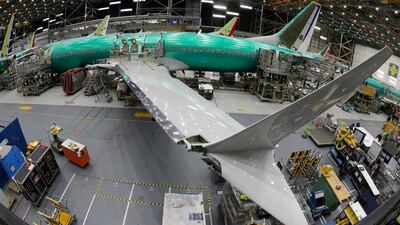The US aviation regulator will slap a $3.9 million (Dh14.3m) fine on Boeing for knowingly installing defective parts on 133 of its 737 jets and failing to oversee its suppliers for quality control compliance.
The parts in question are the tracks located on the leading edge of the wings: they allow devices known as slats to move back and forth to provide additional lift during takeoff and landing, the Federal Aviation Administration (FAA) said in a statement on its website Friday.
The FAA "alleges that Boeing knowingly submitted aircraft for final FAA airworthiness certification after determining that the parts could not be used due to a failed strength test", it said. "The FAA alleges that Boeing failed to adequately oversee its suppliers to ensure they complied with the company’s quality assurance system."
The company is aware of the proposed fine by the FAA regarding the "non-conforming" batch of slat-tracks on the 737 Max and its predecessor 737 Next Generation (NG), and is "working closely with its customers to take the appropriate corrective actions", a Boeing spokesperson said in an emailed statement.
The civil penalty from the FAA comes as Boeing was scrutinised for the design of its 737 Max, which has been grounded for nine months after the model was involved in two deadly crashes that killed 346 people. The FAA's certification of the best-selling jet has raised questions and concerns about the process, leading several global air safety regulators to conduct their own checks on the 737 Max.
Boeing has 30 days to respond to the FAA’s letter proposing the civil penalty, the regulator said.
The FAA said that Boeing's failure to ensure its suppliers complied with quality control standards meant that the so-called slat tracks "were weakened by a condition known as hydrogen embrittlement that occurred during cadmium-titanium plating."
The FAA said in June that 312 of the Boeing 737 Max and the previous 737 NG models may have up to 148 wing parts that could be defective and need to be replaced quickly. It ordered urgent inspections of the jets.
"All affected 737 NGs have been inspected and all slat track installations determined to be required have been completed on the NGs," Boeing said on Friday. "We will ensure that all inspections and any necessary part replacements are performed on all 737 MAXs before they return to service. We have not been informed of any in-service issues related to the slat tracks themselves."
The FAA's charges on Friday involve several of Boeing's subcontractors including third-tier supplier
Southwest United Industries (SUI), Spirit AeroSystems (Spirit) and Kencoa Aerospace.
The US regulator "alleges that from August 16, 2018, through [to] October 9, 2018, Boeing certified approximately 48 aircraft potentially equipped with those slat tracks as airworthy," it said. "Between October 10, 2018, and May 2, 2019, Boeing knowingly certified an additional 85 potentially affected aircraft as airworthy."
In addition to being substandard, the slat-tracks were improperly marked, making it difficult to identify the affected parts, the FAA said.


